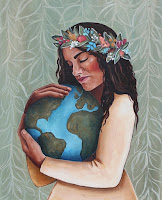The Other and Another: Learning to Recognize and Embrace Difference
The Other and Another: Learning to Recognize and Embrace Difference
 |
| From Paige Payne |
I was introduced to the term Othering as an undergraduate in a history class. Ironically, I can’t remember which history class, but I was obsessed with the concept.
 Did I learn about Othering while discussing Japanese internment camps as a freshman and visiting one in Delta, Utah? Or was it looking at pictures of Huns and noticing how subhuman they looked? Was it talking about Jewish pogroms throughout Europe? About the Holocaust? About the physically and mentally disabled who were sterilized and killed under the rise of Nazis? Was it learning about slavery? Was it learning about colonialism?
Did I learn about Othering while discussing Japanese internment camps as a freshman and visiting one in Delta, Utah? Or was it looking at pictures of Huns and noticing how subhuman they looked? Was it talking about Jewish pogroms throughout Europe? About the Holocaust? About the physically and mentally disabled who were sterilized and killed under the rise of Nazis? Was it learning about slavery? Was it learning about colonialism? Othering refers to marking an individual or group as irreconcilably different and then perceiving and treating them as inferior or as an outsider.
Othering is what drew me to classes about American slavery and Modern African history as I struggled to make sense of how people could have been so cruel to each other, as I tried to grapple with guilt and responsibility for the past I was not a part of but still living with the effects of as a white individual in the US.
Othering is also what has called my name in German literature over the past three years. Who decides what is Other? Who is Othered? How are Othered characters marked as such?
As I have thought about this, I have wrestled with a contradictory idea. This past year, I have been struck by the concept of Anothering. This is my own term and something I hope to develop academically over the next few years in connection with Othering.
Anothering is a reaction to Othering that takes away the value of difference.
When someone is Othered, they are marked as such. Because an individual looks, acts, talks, loves, dresses, eats, works, or plays differently, they are seen as less than us and oftentimes less human. They can experience prejudice, social isolation, depression, systemic oppression, and violence.
 |
| From Melissa T. Kamba From Paige Payne |
I believe most people recognize this kind of Othering as bad. Many people are trying to see people as people first, and labels second. Even if we fail at this many times over, we try to remember that others are human beings.
But then many times, we overcompensate. This is when we Another. We think, “Because this person is a human, they are just like me. Well maybe they aren’t just like me, but we are more the same than I thought. They are Another person like me.” I find Anothering problematic in this erasure of difference.
 Othering is awful and we know it leads to all sorts of overt nasty -isms and -phobias like racism, sexism, xenophobia, homophobia, etc. It’s easy to see why Othering is damaging for those who Other and those who are Othered. We should all do our part to fight against these types of aggressions.
Othering is awful and we know it leads to all sorts of overt nasty -isms and -phobias like racism, sexism, xenophobia, homophobia, etc. It’s easy to see why Othering is damaging for those who Other and those who are Othered. We should all do our part to fight against these types of aggressions.
But what is the harm in Anothering?
Anothering takes away from the value and importance of difference. Anothering makes generalizations about all lives being similar.
All lives have a similar worth, but not all lives have similar experiences.
This is why it is important to have people come together from different backgrounds to make decisions in organizations, businesses, politics, and the like.
A woman and a man have the same worth, but different experiences.
A Black individual and a white individual have the same worth, but different experiences.
A gay man and a heterosexual woman have the same worth, but different experiences.
A disabled woman and an able-bodied man have the same worth, but different experiences.
We are treated differently and society sends us different messages, despite proclaiming equality for all. We see ourselves represented differently.
When was the last time you saw deity portrayed as a black woman?
When was the last time you saw pictures of Jesus as NOT WHITE?
When was the last time someone used your gender as a joke?
Saw your religion as a cult?
Viewed your partner as sin?
Used your race as an excuse?
Comparing someone having brown or white skin to someone having brown or blonde hair may seem like the kind thing to do to avoid Othering. But pretending we live in a "blind world" (corlorblind, genderblind, etc) does not help us solve the problems that continue to confront us as we try to listen better to our sisters and brothers in the world.
We are all other. But that doesn’t make us Other.
There is a sweet spot between amplifying difference and dismissing differences as part of a greater sameness.
 |
| "In Her Arms" by Paige Payne |
I invite you, as we are all learning to see differently, to take time to listen to those whose experiences are different than yours. To recognize that yes we are all valued, but that does not mean we are the same. While we are trying to avoid Othering, let us also avoid Anothering.




Comments
Post a Comment